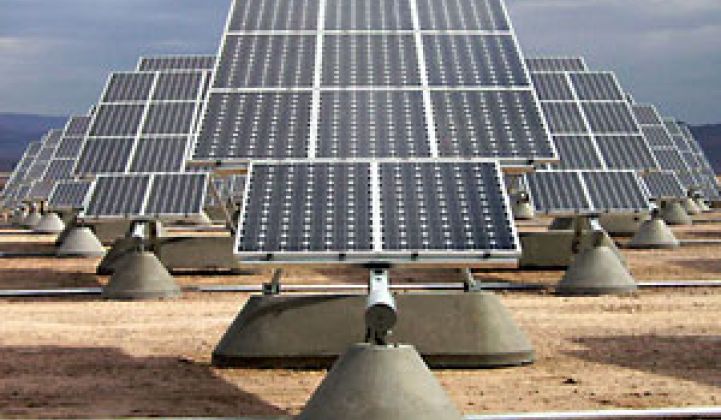Correction: An earlier version of this story incorrectly stated that Cypress Semiconductor would sell its SunPower shares.
Cypress Semiconductor Corp. (NYSE: CY) plans to give away its stake in solar-panel maker SunPower Corp. (NSDQ: SPWR), cutting its strongest tie to the solar industry.
The company will distribute 42 million of its Class B shares – worth about $3.6 billion in value –beginning Sept. 29, CEO T.J. Rodgers announced Friday.
The semiconductor company owns 52 percent of SunPower, according to Cypress' most recent quarterly filing with the U.S. Securities and Exchange Commission, and holds 88.5 percent of the voting power. (The Class B shares have the voting power of eight common shares.)
The move completes the spinoff of SunPower from Cypress, which began divesting itself of the company in 2005, when it took its subsidiary public.
Nataniel Bullard, a senior analyst at U.K.-based research firm New Energy Finance, said Rodgers hinted that the reason for the spinoff was a focus on high-margin growth.
In the announcement, Rodgers called the stock distribution "an unprecedented opportunity to unlock the value of a semiconductor operation that ... has become one of the "leading suppliers of high-margin proprietary and programmable solutions."
"Perhaps the Cypress board and its big shareholders see PV manufacturing becoming a naturally low-to-medium margin game and want to focus on high-margin only," Bullard said.
The news bucks the trend of semiconductor companies entering the solar industry, which came to the forefront when Applied Materials (NSDQ: AMAT) entered the solar market in 2006.
Some analysts have speculated that chip companies could have a natural advantage in the market and could pose a threat to incumbent solar companies (see Chip Giants Delve Deeper Into Solar).
"We've been saying for a long time: This is the domain of the semiconductor guys," said Ron Pernick, a principal with Clean Edge, in June. "If Intel can take intelligence out of its semiconductor operations, spin it out and deliver on funding, who better to scale up manufacturing than one of the largest makers of chips on the planet?''
Intel in June spun out a solar-cell startup called SpectraWatt, National Semiconductor launched a solar-inverter technology called SolarMagic and Semiconductor Manufacturing International Corp. (NYSE: SMI) announced plans to make polysilicon for solar cells.
But a number of industry insiders have lately questioned whether being a big chip company is such a big advantage after all.
"It's easy to imagine a big company building a pretty sizeable solar business and getting a lot of attention for entering the solar space, but it's hard to imagine a big company winning over a small company on cost and on flexibility,"Michael Rogol, managing director of Photon Consulting, said in July. "We now have officially zero examples of big companies succeeding in solar."
Rick Hill, CEO of Novellus Systems, a semiconductor equipment firm, also is skeptical that the move to solar makes more sense for semiconductor companies than focusing on other growth prospects, according to The Wall Street Journal.
Still, more big companies are likely to continue entering the space – and not just chip companies.
DisplayBank, a research firm in Seoul, expects Korean display companies such as Samsung and LG Electronics to join the global rush to make solar cells next year, reported EE Times.
By 2013, Korea could deliver more than $8 billion in solar panels with a capacity to generate up to 2.6 gigawatts, the research firm forecasts.
Get the scoop on the thin-film solar market with Greentech Media and the Prometheus Institute's new report Thin-Film PV 2.0 or at our upcoming event the Thin-Film Revolution in New York City on Sept. 15, 2008.



